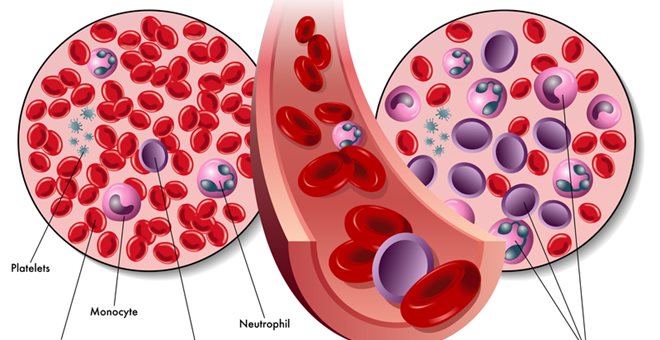Scientific research to treat potentially fatal Acute Myeloid Leukemia (AML) has discovered an unexpected leukemia cell leak that can be targeted by specially formulated drugs
Specifically, the distinguished duo of the Cypriot professor of hematology Dr. George Vassilios and the Greek researcher Dr. Konstantinos Tzelepis at the Wellcome Trust Sanger Institute in Cambridge together with researchers from the Gurdon Institute and their collaborators, including Greeks, have shown that inhibiting the function of the METTL3 gene achieves the destruction of AML cells in humans without cells.
The report, published today in the medical journal Nature, explains that this gene is essential for the survival of cancer cells. At the same time, the report deciphers the mechanism that METTL3 uses to regulate many other leukemia genes.
Acute Myeloid Leukemia is an aggressive form of blood cancer that can occur in people of all ages. It often requires months of intensive chemotherapy and prolonged hospitalization. It grows on cells in the spinal cord at the expense of healthy cells and leads to life-threatening infections and bleeding. Treatments for this disease have not changed in decades and less than one in three patients survive.
Wanting to develop possible new treatments for the disease, the researchers used a genetic modification technique known as CRISPR-Cas9, which seeks to detect vulnerabilities in cancer cells. In the laboratory, they created leukemia-infected mouse cells with mutations in genes that could target human leukemia cells. They performed systematic testing of each gene, identifying what is necessary for the survival of leukemia cells.
These tests showed that there were 46 genes that could be necessary for the survival of cancer cells, many of which produce proteins that can modify RNA, the "server" of the genetic code. Among these genes, the so-called METTL3 was one of the most influential. The researchers even found that while this gene is essential for the survival of leukemia cells, it does not perform any function necessary for the survival of healthy blood cells. This implies that the METTL3 gene is a good potential drug target.
Professor Tony Kouzaridis, co-lead researcher at the Gurdon Institute at Cambridge University, said: "There is a desperate need for new treatments for Acute Myeloid Leukemia and we are looking for genes that would be good drug targets. We have identified METTL3 as an extremely viable target against AML. "Our study will inspire pharmaceutical companies to find drugs that specifically block METTL3 for the treatment of AML."
To make proteins in a cell, DNA is replicated in messenger RNA (mRNA), which in turn translates into proteins needed by the cell. However, whether a protein will be produced can be controlled by modifications to the RNA. This is a newly discovered type of gene control called "RNA processing".
The researchers found that interfering with the function of METTL3 prevents the transmission to the RNA of organic elements (methyl groups) that are necessary for the production of proteins needed by cancer cells to not die.
Dr Konstantinos Tzelepis, one of the lead researchers behind the report and CRISPR technology expert at the Wellcome Trust Sanger Institute, said: "This study revealed a whole new gene control mechanism in AML that works through RNA modifications. We have found that if we block the activity of the enzyme METTL3, we stop translating an entire group of proteins needed by leukemia. "This mechanism suggests that a drug that inhibits METTL3-induced methylation (AMR) could be effective against AML without affecting healthy cells."
Dr. George Vassiliou, co-lead researcher at the Wellcome Trust Sanger Institute and Professor of Hematology at the Cambridge University Hospitals NHS Trust, said: Our treatments have changed a bit over the decades and the results remain poor for the majority of patients. We thought we had to think differently and look in new places for ways to treat the disease and with METTL3 we have found an exciting new drug target. "We hope that this discovery will lead to more effective treatments that will improve the chances of survival and quality of life for patients with AML."
